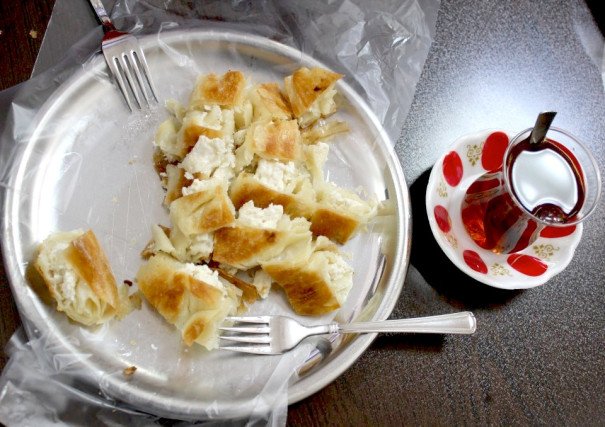
Börek by the Sea

Börek by the Sea
Börek in Izmir
The coastal city of Izmir is Turkey at its most modern and westernized. Its inhabitants flock not to mosques and madrasas but to shopping malls, bars, and cafes. Thudding hip hop drowns out the call to prayer. The beards on the young men are hipster, not hajji. Known by other Turks as Infidel Izmir, Turkey’s third largest city is one of few to have resisted the governing AK Party’s Islamist surge.
The AK Party’s leader, Tayyip Erdoğan, looks to the country’s imperial past for inspiration. He has introduced the language of the Ottoman Empire as a subject for study in schools, and the minarets of a gigantic new Ottoman-style mosque will soon pierce the Istanbul skyline. Many regard Erdoğan’s nostalgia as his latest attempt to dislodge Mustafa Kemal Atatürk, who transformed Turkey from Ottoman caliphate into secular republic, from the nation’s affections. Pro-Atatürk Izmir is unimpressed: in 2009, a 40-meter-high bust of the father of modern Turkey was sculpted on a hillside in a southern suburb.
Breakfast, however, is one Izmir custom of which Mr Erdoğan might approve. Börek, a light, layered pastry filled with cottage cheese, minced meat or spinach, is a throwback to the Ottoman era. The taste for the pie spread through the empire from Anatolia, becoming particularly popular in the Balkans. Breakfasting on it is an Izmir passion. Börek shops dot the city, and Izmirlis queue every morning for a few chopped up squares of the flaky pastry to eat in or take home. Wandering through the Nergiz district on a Sunday morning, I chose a cafe run by descendants of Bosnian migrants for my breakfast (I could have chosen a Macedonian joint down the road instead, but was swayed by the sight of housewives in pajamas queuing outside Bosna Börekçisi).
I ordered a portion of kol boreği, ‘arm börek’, and a glass of tea (the tea itself came from the Black Sea town of Rize). In the back of the cafe, I could see the pastry chef in action, spreading dough with his fingertips on a metal table and thinning it by stretching it and then flinging it out in front of him like a bed sheet (the best pastry, it is said, is so thin you can recognize faces when looking through it).
Once sufficiently transparent, the dough is covered with filling, rolled into a long spiral and baked at a low temperature. The cottage cheese version I order is crispy on top, the gently flavored layers below soft and moist. For Bosnian mothers, börek-making skills were traditionally an important criterion for choosing their sons’ wives. My breakfast was made under less nerve-wracking circumstances, but it would, I think, have withstood the sternest mother-in-law’s scrutiny.